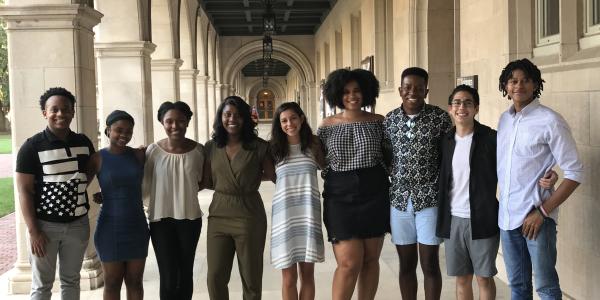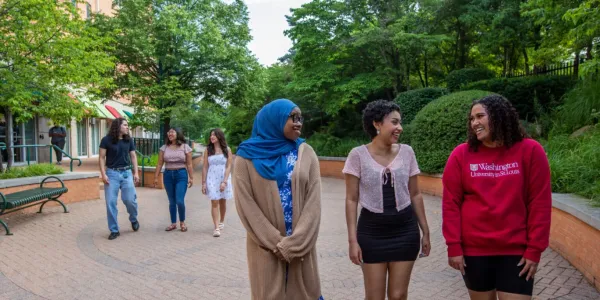The Mellon Mays Undergraduate Fellowship, established to address the underrepresentation of minorities in the professoriate, supports fellows in the process of entering the academy. The program, directed by Jeffrey Q. McCune Jr., an associate professor of performing arts and women, gender, and sexuality studies, funds two years of independent research, weekly seminars, annual conferences, and pre-graduate advising, among other things. Arguably, though, the most important aspect of the program is the network of relationships formed among students, faculty, and administration—and the most important of these is the mentoring relationship.
"Mentoring is the core of the Mellon Mays Undergraduate Fellows' experience," says McCune. "We have such a committed faculty, who meet and work weekly and bi-weekly with these ambitious students. It is under this faculty mentorship, where the students maximize their resources by forging a relationship with a scholar in their field(s) of interest. These mentors walk fellows through every step of the program, ensuring they have the necessary tools to write a carefully researched, rigorous thesis. Indeed, without this component, the program would fail in its mission to truly usher students into graduate school and onward to become apart of a collective of top-notched scholars."
Fellows are encouraged to seek out potential faculty mentors as early as the application stage. These mentors serve not only as models, but also as active participants in the students’ projects, providing suggestions, readings, and advice throughout the research process. Clarissa Hayward, professor of political science, is currently mentoring two Mellon fellows, and further speaks to the importance of this relationship.
“Doing good research is very different from doing good course work,” she says. “Mentorship is important because it helps students develop the skills they need to define a research question, master the existing literature, design their own study, and make an original contribution. As a mentor, I love seeing how my students’ projects develop over time, and how they develop and mature as scholars.”
Mary Laurita, the administrative coordinator of the WashU Mellon program since 2000, points out that mentorship remains critical in nearly all aspects of the program. “Mentorship is encouraged at every level, from the staff in the national office, to program coordinators, faculty members at various institutions around the country, graduate alumni, and current fellows,” she says. “With mentorship from faculty, administrators, and graduate students—both Mellon Mays alumni and our own Graduate Chancellor's Fellows—our fellows learn how to do meaningful scholarship that supports their community activism, understand the graduate-school application process as well as graduate-school life, and gain a greater understanding of what a commitment to an academic career might entail. As most of us who have had mentors ourselves know, these relationships can have a huge, positive impact on a student's intellectual and career trajectory.”
Mentor relationships not only aid fellows in their scholarly pursuits, but also in their personal and professional development as they work to increase the representation of marginalized voices within the academy. The transformative nature of mentorship takes a well-rounded approach to introducing students to the life of the mind, and fulfilling the mission of the Mellon Mays program. Already, McCune says he regularly sees fellows regularly "place at the top of candidacy for graduate school, rise to the top of academic searches post-graduate school, and are there present shapeshifters in so many universities across the country." He adds, "As director, seeing the rates of success in the program, I feel most excited to usher in a new class of scholars every year, committing to them my intellectual, physical energy. It's beyond worth it!"
The most recent class of Mellon fellows were announced just last month, and they hope to carry this legacy forward along with their faculty, graduate student, and alumni mentors. McCune also has high hopes for them. He says, "This new cohort is exciting in their diverse interests, their commitments to work both within and beyond the academy, and their clear passion for learning and thinking in some pretty advanced ways. Like every class selected during my tenure, I am impressed with the level of enthusiasm for research, engaging ideas, and their insistence on doing work that matters to them and their communities."
Meet the new cohort below, and learn more about their projects exploring issues of identity and social justice.





